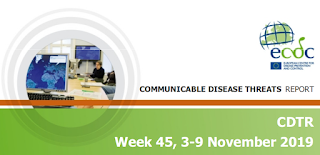#15,510
Conventional wisdom - particularly when it comes to infectious diseases - is always subject to change. In recent years we've seen a number of unexpected findings, and `exceptions to the rule', that end up opening new avenues of scientific exploration.
Six years ago it was generally accepted that Ebola was simply too debilitating, and too lethal, to have `legs’ . . . to spread beyond a limited geographic area. Those infected were believed `too sick to travel’, and therefore small outbreaks would inevitably `burn themselves out’ in relatively short order.
And then, defying all expectations, we saw the first urban epidemic of Ebola spreading across three West African nations in 2014, resulting in more than 28,600 cases and causing at least 11,325 deaths (cite).Additionally, from this epidemic we learned that the Ebola virus can persist in a `recovered' patient for months (see Virus Evolution: Rapid Sequencing Reveals Rare Ebola Transmission Via Breast milk And Semen), adding new, and unexpected ways to reintroduce the virus back into the community.
In 2015, an obscure vector borne arbovirus - Zika - was suddenly implicated in hundreds of severe birth defects in South America (see NEJM: CDC Concludes Zika Causes Microcephaly & Other Birth Defects) - an impact never before attributed to a mosquito borne virus.
But Zika had another curve ball to throw, as we also learned in early 2016 that a Zika infection could be transmitted sexually. Something that had not been previously considered a serious public health risk (see WHO: Updated Interim Guidance On Prevention Of Sexual Transmission Of Zika Virus).
Today, the ECDC is reporting in their CDTR (Communicable Disease Threats Report) on a case of suspected MSM sexual transmission of another mosquito borne virus; Dengue.After you follow the included links, I'll have a brief postscript:
New! Autochthonous Dengue case - Spain - 2019
Opening date:7 November 2019
Latest update:8 November 2019
Epidemiological summary
On 7 November, according to media quoting health authorities, Spain reported two confirmed cases of dengue in men who have sex with men (MSM) residing in the municipality of Madrid in September. The most recent detected case is a man who did not travel outside of Spain recently.
He developed symptoms mid September and he was laboratory confirmed for dengue. This case is classified as autochthonous. After confirmation of this case, his partner, a male who presented similar symptoms starting beginning of September, was tested and confirmed positive for dengue. This case had a recent travel history to Cuba and to the Dominican Republic at the end of August and beginning of September, this case is classified as imported.
Entomological investigations at the place of residence of the men and surroundings were negative; no adult forms of Aedes albopictus were detected. The genetic sequencing confirmed that the virus strain of both cases is identical. Further investigations showed that the virus is also similar to dengue viruses circulating in Cuba.
Source: Journal of travel medicine, Eurosurveillance
ECDC assessment
Spain assessment: In the absence of data supporting vectorial transmission or other known routes of exposure to dengue infection, we consider that the autochthonous case was most likely infected through sexual transmission. The experts in Spain could not identify any case of sexual dengue transmission among MSM in literature and only found a reported case of sexual transmission from a woman to a man in South Korea.
ECDC assessment: ECDC is not aware of any previous report of confirmed sexual dengue transmission among MSM. However, one scientific article describes a probable female-to-male sexual transmission of DENV. In an article published in Eurosurveillance, semen was found to be positive for dengue for 37 days post symptom onset. This mode of transmission for dengue is unusual and unexpected. Source: Journal of travel medicine,
Eurosurveillance Actions
ECDC will prepare a rapid risk assessment
While the jury is still out on the sexual transmission of a number of other (overwhelmingly) vector-borne viruses - including West Nile, Yellow Fever, and Chikungunya - the revelations regarding Ebola and Zika have sparked a good deal of new research into the matter, including:
Sexual transmission of arboviruses: More to explore?
Zika Virus and Sexual Transmission: A New Route of Transmission for Mosquito-borne Flaviviruses
WEST NILE VIRUS MENINGO-ENCEPHALITIS: POSSIBLE SEXUAL TRANSMISSION.All reasons why, when you talk about infectious diseases, it is best to never to say never.
Prolonged shedding of Chikungunya virus in semen and urine: A new perspective for diagnosis and implications for transmission
